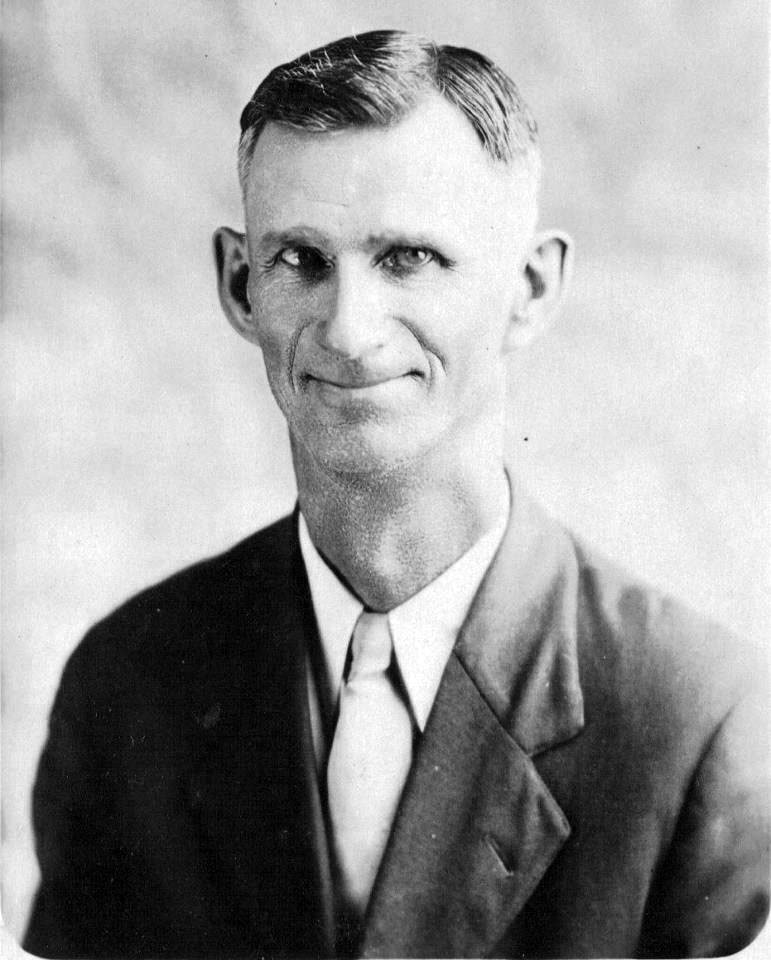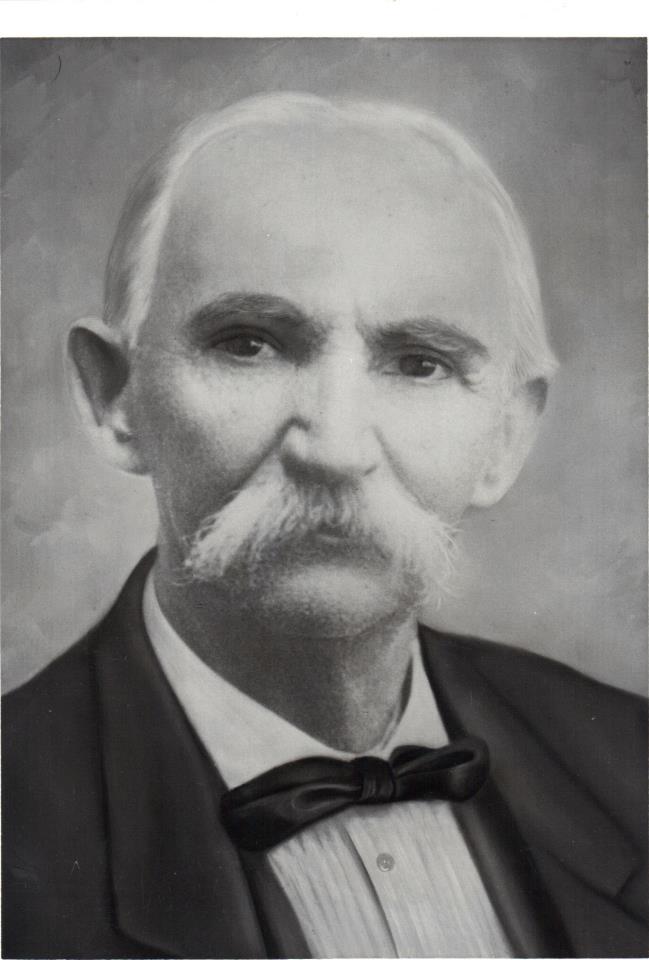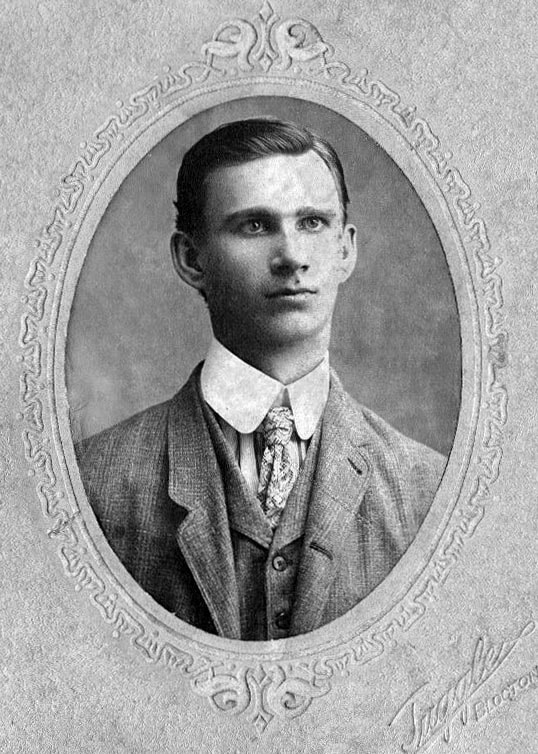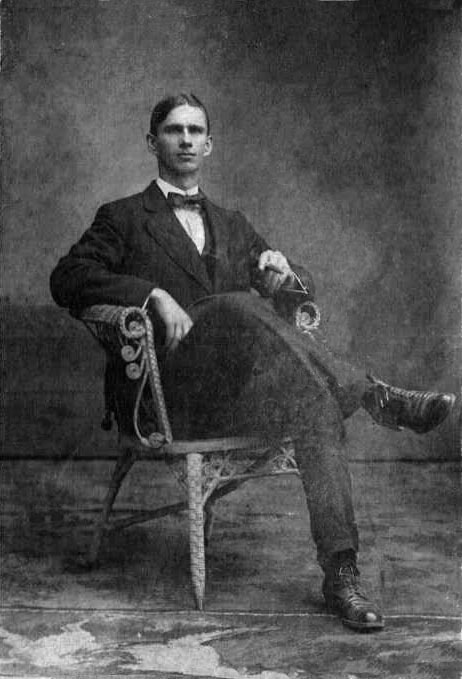I know some facts. But what do they tell me?
| Jud May (1845-1928) was brother to my grandfather Jonathan Brooks May, making Pickett my father’s first cousin and my second cousin. Edna married Wade Martin of Sawyerville and one of their sons, Murray, married my mother’s sister, Martha Julia Turberville. Although I always referred to Murray as uncle, he was also my third cousin. Left: Uncle Jud May |
In my childhood memory Pickett had an upstairs room accessible by stairs on the east side of the house where his stepmother lived. That he lived with his stepmother is confirmed in the 1940 census. Miss Louise Martin, his stepsister, also lived in that house. My sister has a vague recollection that at some point Miss Louise had been a nurse elsewhere, possibly Birmingham, and possibly she had returned to Sawyerville to take care of her mother during her latter years.
Based on information from the 1950 census, by 1950 Pickett had moved across the railroad tracks to live in a small house behind where his sister Susie and stepbrother James Robert lived, and in my mind’s eye he helped out on Mr. J.R.’s farm. I know that I have a strong memory of him being involved in the butchering and processing of a large hog. I have recollections of his overseeing cotton pickers in the field. What I don’t recall is whether he ever clerked in any of the Sawyerville stores. Did he receive a salary? I don’t know. He did receive some sort of check, and one of the Sawyerville scandals of my youth was that his nephew Murray insisted on payment of a fee if he cashed that check for his uncle. My father began doing that for free.
Pickett was 16 years older than my father, his first cousin. They always seemed close, and Pickett called my father Bud. And that reminds me: one of my father’s favorite songs was “My Buddy.”
In his earlier years Pickett lived away from Sawyerville and worked in the coal mines north of Tuscaloosa. Did he labor away with shovel and pick? Did he manage the mules and horses involved with coal mine work? With his farming background, possibly. Was that check he got on a regular basis a result of his coal mine work? Possibly. I have been told that while working for the mines he paid for the education of his nieces Margarete and Thelma, daughters of his sister Edna. It has been said that these were school fees of some sort, not college fees, and if that is the case if I knew their birth dates I might be able to pin down more accurately when Pickett may have been at the mines.
[Note: after I posted this piece I received the following updated information from Cousin Doug Mathis: Thelma and Margarete Martin. I show Thelma born on January 12, 1904, and Margarete sometime in 1908 (I haven't been able to nail down a precise birth date for her yet). In looking at census records, in 1910, I find the Martins (Wade, Edna, and children Thelma, Margarette, and Donnie) living in Bibb County. Also living in the household, identified at Wade's brother-in-law, is OSCAR MAY. He is listed as 32 years old and employed as a draughter at a coke oven. I therefore wonder if the story about Pickett paying for his nieces schooling might more likely be attributed to Oscar. This is not to say that Pickett couldn't have done it, but in all the censuses from 1900 to 1940, Pickett is in Hale County. In fact, in the 1930 Hale Co. census, Pickett is shown as living in the household of Freeman and Cammie May, along with Freeman Jr., and W. Edward. ]
He also spent time working on the May Farm 4 miles west of Sawyerville, and it is said that he lived in a house across the road from the main May house beside a man-made pond. That may have been the house where Freeman and Cammie lived at the time of the 1930 census. Later on in my childhood that house was where the May cook Julia lived. I wonder if possibly if he lived on the faerm at more than one time. Possibly he was working there for his Uncle Brooks when my father was a child growing up. That “Bud” suggests a childhood friendship.
| Pickett never married. He did go horseback riding with Miss Nora McLaughlin, who lived in the old Kimbrough House just up the hill from where the May Farm was located. As a child that seemed romantic to me. I understand that after she moved away she did write to Pickett. Recently I have heard that sometimes they would be joined on those rides by my mother and Alice Coleman, sister to the late Harris Magruder Coleman. I do know that in her early married years my mother would go riding with Alice, who reportedly suffered from some illness or physical problem and who died early on. It would make sense that Picket and Miss Nora would have accompanied them. Ladies out riding needed a man in the party. And certainly the young Pickett was presentable enough! |
The only words I can recall Pickett ever saying in the store were “Bell’s ringing,” a comment that would be triggered whoever someone pulled up to the gasoline pump out front and ran over the mat that would ding or when evener the telephone rang. I must have greeted him in some way (my parents would hae insisted that I do), but if so it must have been so perfunctory that I have no memory of my doing so or his response. All I can recall is this tall skinny taciturn unsmiling figure just sitting there in the straight-back chair, sometimes tipped back a bit so that the front legs were off the floor.
He did have some sort of official role whoever elections were held, overseeing the day’s events and after the polls closed taking the locked ballot box to the courthouse in Greensboro where he participated in counting the votes. How did he get there? Memory fades. He had no car, so someone must have taken him. I’m not even certain he could drive. But my sister has recently reminded me that at times he would actually hitchhike to Greensboro carrying the ballot box with him. Somehow he got back to Sawyerville the next morning. I wonder if possibly Osmund Coleman, the rural carrier who lived in Greensboro, would swing by the courthouse and pick him up. Or maybe he simply hitchhikekd.
After my Uncle Tom's death in 1941 from a shotgun wound, the circumstances thereof still and will remain vague, Tom's widow, Vera, gave the gun to Pickett, who kept it the rest of his life. Later on the gun passed to hs great-nephen Jim Walton and later on to Jim's son, who, coincidentally and through another chain of events, also ended up with the shotgun that killed my Uncle Ellery.
Pickett took some care with his personal appearance and was always clean-shaved. In the latter stages of his life his sister Susie could no longer take care of him and he was moved to the nursing home in Greensboro. One Sunday after church my parents went by to visit him. My father noticed that he had stubble on is cheek and asked Pickett if he would like for my father to shave him. Picket said yes, and my father performed this service for his first cousin, one that turned out to be his final service.
Shortly after my parents got home that day Pickett’s great-nephew Jim Walton called to report that Pickett had just died. It was June 29, 1969. Picket was 87 years old, not a bad life span back in the day.
So after this assemblage of facts and old tales and speculations about Cousin Pickett, can I say that I know him better? Not really. He remains a mystery to me. What did he think about? What did he believe? After supper in the evening when he lived upstairs at Aunt Iddi’s and later when he moved over to his sister Susie’s place what did he do? Did he listen to the radio? Did he read, and if so, what? Did he sit in his chair and stare at the walls of his room, or weather permitting, did he sit on the porch and watch the stars and the fireflies?
If only I could send a message back through time into the mind of Little Jonathan sitting in that store probably on the counter by the cash register while Pickett was sitting in his chair just across the aisle from me. There is so much that later on you will regret that you never asked him. You will regret that you never got to know him better. You will feel that is this your loss, and possibly his loss as well.
But the young are not interested in old-timey stuff. You don’t really care about knowing that old tree or that rock just sitting there. It is when you become an old-timer yourself that those regrets kick in.
There’s that old saying: If Youth knew, if Age could.
I am exceedingly grateful to cousin Doug Mathis for his contributions to reasearch on Picket, and I have re-edited the piece because of his later research since this was first published on my website.




 RSS Feed
RSS Feed